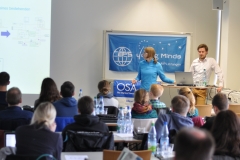 This year, the Erlangen MPL YM Section organized three school outreach events. On July 27 we had the first school outreach event with 23 students from the Gymnasium Fridericianum in Erlangen. This was followed by a similar event on August 20 with 18 students from different local schools. Finally, on December 8, we hold our school outreach event for 15 winners of the German youth science competition “Jugend forscht” who were visiting our home institute.
This year, the Erlangen MPL YM Section organized three school outreach events. On July 27 we had the first school outreach event with 23 students from the Gymnasium Fridericianum in Erlangen. This was followed by a similar event on August 20 with 18 students from different local schools. Finally, on December 8, we hold our school outreach event for 15 winners of the German youth science competition “Jugend forscht” who were visiting our home institute.
Many people are fascinated by and interested in fundamental research. However, only a few have a realistic picture of how science really works. With our school outreach events we want to convey a realistic picture of what it means to do fundamental research and why it is of importance. To do so, we first give an overview of the organization of our home institute, the Max Planck Institute for the Science of Light, and then give an insight of our daily business as researchers. We answer questions like: How do researchers get new ideas? What steps are necessary to conduct an experiment? What problems do usually occur? How do researchers make other aware of their findings? We try to share our real-life experiences from our scientific work in the field of optics. This first part is followed by a demonstration experiment that relates to a current research topic in optics. Currently, we have set up an experiment to make single molecules visible. Another experiments let the audience experience actual quantum fluctuations. The experiment are accompanied by an interesting introduction to the physics involved and an explanation of the observations. In addition, we usually screen a short movie that explains (free-space continuous variable) quantum key distribution, a current research topic at our institute. Members of our chapter answer questions after the movie. When the school outreach event takes place at our home institute, we also offer the participants a tour through our labs.
By talking about a topic beyond the regular curriculum, we try to fascinate the high-school students and infect them with our passion for optics. Moreover, we emphasize the impact of optical technology in the present and future. In addition, we want to motivate young people to study science, in particular optics, and later on become part of the scientific community. Due to the personal experience of the presenters and the different styles of presentation during the events, we usually raise a lot of interest and questions among the audience. We plan to continue this successful series of school outreach events also in 2016.
[nggallery id=13]
